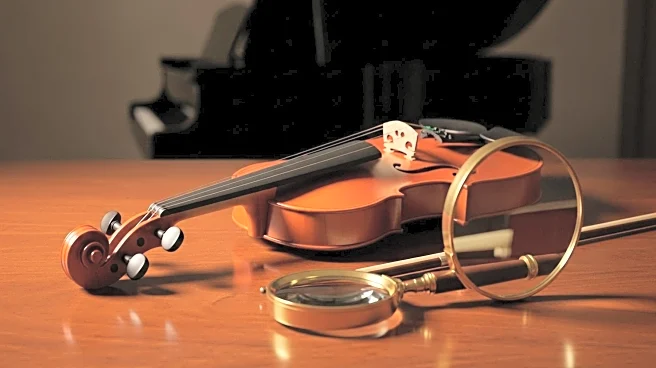What is the story about?
What's Happening?
Dr. Paul Wingfield, a composer and director of studies in music at Trinity College, Cambridge, has authenticated a violin once owned by Albert Einstein. The verification process began after Wingfield wrote a musical drama titled 'Einstein's Violin,' inspired by a family photo and a book co-authored by his late brother-in-law, Joseph Schwartz. The drama, which premiered in Highgate, north London, became a tribute to Schwartz. Following a performance, Wingfield was contacted by an auctioneer seeking help to verify a violin believed to have belonged to Einstein. Through extensive research, including comparing inscriptions and examining historical documents, Wingfield confirmed the violin's authenticity. The instrument, a 1894 Zunterer violin, was expected to sell for £300,000 but ultimately fetched £860,000 at auction.
Why It's Important?
The authentication of Einstein's violin by Dr. Wingfield highlights the intersection of music, history, and science, offering a unique glimpse into the personal life of one of the most renowned physicists. The sale of the violin for a significant sum underscores the cultural and historical value attributed to items associated with iconic figures like Einstein. This event also demonstrates the importance of meticulous research and expertise in verifying historical artifacts, which can lead to substantial financial transactions and preserve cultural heritage. Collectors and historians stand to gain from such verifications, as they ensure the authenticity and provenance of valuable items.
What's Next?
The successful auction of Einstein's violin may prompt further interest in other personal artifacts associated with the physicist, potentially leading to more discoveries and verifications. Auction houses and collectors might seek similar expertise to authenticate items with historical significance, increasing the demand for specialists like Dr. Wingfield. Additionally, the drama 'Einstein's Violin' could see increased interest and performances, further celebrating Einstein's legacy through music.
Beyond the Headlines
The authentication process undertaken by Dr. Wingfield involved not only musical expertise but also a deep dive into historical and scientific details, such as the measurements of Einstein's hands and inter-war Belgian customs regulations. This highlights the interdisciplinary nature of verifying historical artifacts, where knowledge from various fields contributes to a comprehensive understanding of an item's provenance. The emotional connection Wingfield felt during the process also underscores the personal impact such work can have on individuals involved in preserving history.















